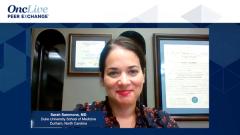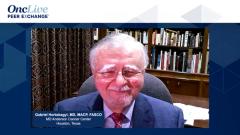
CDK4/6 Treatment Selection for HR+/HER2- MBC
The impact of recent data presented at ESMO 2021 in terms of selecting an appropriate CDK4/6 inhibitor as first-line treatment of HR+/HER2- metastatic breast cancer.
Episodes in this series

Joyce O’Shaughnessy, MD: I want to know from Gabe and Sarah, we’ve got these new survival data. Does this change your first-line strategy? We may not have all been using ribociclib as our first CDK inhibitor in the first line. What are we all going to do in our practices? Some people say, “We’re going to wait for the other survival data.” Some will say, “I’m going to take the bird in hand.” Gabe, what do you think?
Gabriel Hortobagyi, MD, MACP, FASCO: Well, it is interesting. A few years ago when the PFS [progression-free survival] data became available, we started to think that despite differences in preclinical characteristics, that these 3 agents were interchangeable in terms of their efficacy. The only difference was a slight difference in toxicity as Neil has mentioned. Now there are emerging differences. There are some emerging differences in pharmacokinetics, there are some emerging differences in what we know about overall survival [OS], and there are some emerging differences in what we know in the adjuvant setting, which might have some impact in how I structure my treatment selection in the metastatic setting too. I’m curious why the oldest trial—because PALOMA-2 started about a year earlier than MONALEESA-2, and it’s about the same size, same population—it still hasn’t reported an overall survival analysis.
Sarah Sammons, MD: I asked my MSL [medical science liaison] about that, and she says it’s because it’s a 1:1 randomization versus a 2:1 randomization, and they just don’t have the number of events yet. That’s what they’re going with.
Gabriel Hortobagyi, MD, MACP, FASCO: For the time being and until such a time as we have the data from the MONARCH-3 and the PALOMA-2 for overall survival, I’m compelled to use what the data suggest that I should use, which is the MONALEESA-2 regimen. That’s going to change my practice a little bit because I used palbociclib and ribociclib almost interchangeably. I felt comfortable with both drugs. I preferred to use abemaciclib in later lines and in different settings. Now I’m changing that until further notice. I’m certainly open-minded about the other 2 agents and the other 2 trials, but this is where the money is today.
Joyce O’Shaughnessy, MD: I’m so sorry. I’m going to interrupt this. I’m going to go, I have to hide him. I’m so sorry. I’ll be right back.
Gabriel Hortobagyi, MD, MACP, FASCO: He wants to make a comment.
Neil M. Iyengar, MD: Yes.
Sarah Sammons, MD: He really likes ribociclib. I would say something similar. I think the body of evidence with ribociclib is starting to speak for itself. We now have overall survival data from MONALEESA-2, MONALEESA-3, MONALEESA-7, and you can’t ignore that. In the absence of head-to-head comparisons, which we’ll never have, you can’t make cross-trial comparisons, but we do have this first-line overall survival benefit that’s the longest we’ve ever seen that continues to improve over time. I have certainly been reaching for ribociclib more in my practice. I think we’ve all gotten very used to using palbociclib, and so it has been a default for many clinicians. But this overall survival has changed my practice a bit, and I certainly reach for ribociclib for premenopausal women due to MONALEESA-7. Abemaciclib, I do reach for. We have a pretty robust brain and spine metastasis center here, so I do reach for abemaciclib for my patients with brain metastases. And I do reach for abemaciclib for my patients who have a hefty amount of liver disease burden.
Joyce O’Shaughnessy, MD: How about you, Neil? How will you choose a first-line therapy given the new MONALEESA-2 data and upcoming other survival data that will report?
Neil M. Iyengar, MD: I’m a believer in the data that have been reported. I think that when you look at the overall survival benefit associated with ribociclib use, it’s extremely clear. That’s really the driving factor in my decision-making in terms of what I’m using in the first-line setting. I think that’s where the new default needs to be. I think Sarah said it well, that many clinicians have defaulted based on timeline, palbociclib was first available. Now that we have new data and longer-term follow-up, I think it’s time to reset our default. We do this all the time in our practice when new data come out. This is no different. This is the new default for me based on the longer-term OS data.
Gabriel Hortobagyi, MD, MACP, FASCO: There’s an enormous power to being first on the market, and clearly palbociclib has had a great advantage in that. We'’ve seen that with aromatase inhibitors, with SERMS [selective estrogen receptor modulators], with a number of other drugs. I agree with Neil and Sarah, I think the data have to speak for themselves, and we need to follow the data. If the data change tomorrow or the day after, we’ll adapt to that, but for the time being, I think this is the most compelling data we have.
Joyce O’Shaughnessy, MD: I’m there too. I’m going to be utilizing this as my go-to first-line regimen. The only caveat I’ll say, where I’m still at, is when faced with real primary endocrine therapy resistance, where I feel pretty confident that endocrine therapy alone would never work, I still utilize abemaciclib in the first line. It’s my interpretation of that particular subset of patients that there are very robust data there, and the fact that you don’t have to take the week off. Until further notice, until I get additional data in that primary endocrine therapy-resistant, which is a small subset of patients. Otherwise though I’m going to offer the MONALEESA-2 data based on the new survival advantage.
Gabriel Hortobagyi, MD, MACP, FASCO: There is another aspect of this that we have not had the time to discuss. Part of the evolution of this is that the best preclinical data suggest that continuous suppression of CDK4/6 is best. Neither palbociclib nor ribociclib have used the continuous schedule to date, abemaciclib has. Now there are ongoing studies certainly with ribociclib with a continuous schedule at a different dose. I think it’ll be interesting to see how that works out because it might be an even better way to use these drugs, and certainly ribociclib.
Joyce O’Shaughnessy, MD: Thanks guys, very much. That was a great discussion. I think we’re up to date now on the CDK4/6 inhibitors and the evolving data and what they mean to our practice. Thanks for a really nice discussion.
Transcript edited for clarity.





































